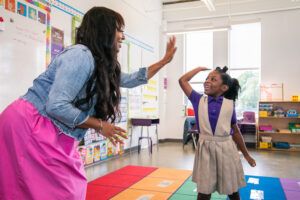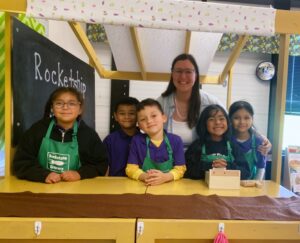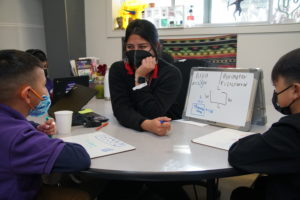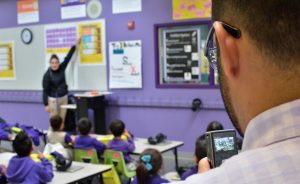
Social Emotional Learning in the Time of COVID-19
Francesca Furci, Manager, Psychological and Social Emotional Services
Teachers know this all too well, education encompasses a whole lot more than just academics. Teachers pour their hearts into lessons and learning experiences every day that educate the whole child. We often do this through social-emotional learning. And to no surprise, we know this learning isn’t isolated to community meetings or circle time – it’s an all-day process. It’s all the moments that aid our students in building and managing the social and emotional skills they need to make understanding of themselves and the world.
Take a look at these 5 ways that you can integrate social-emotional learning throughout the entire day!
1. Be more than the teacher at the front of the room…Humanize yourself.
Take the time to get to know your students. Use five minutes at the start of class to truly listen to what’s happening in their days. If you’re virtually teaching that could mean meeting them in a breakout room to discuss why they keep leaving their Chromebook. If you’re in person you could kneel at the child’s desk, ask why their name isn’t on the paper yet and then see if anything interesting has happened to them today.
Before you dive into your lesson plan, why not share a little bit about what you did over the weekend or what’s been hard in your day so far. This proactive attempt to build genuine human connection goes a long way. It also makes it feel more natural when you work in social emotional supports at a later time.
2. Acknowledge that there is a world outside our classroom’s four walls, and discuss its impact on our learning.
In today’s world, this is more important than ever. Do students have a place in your classroom to celebrate and learn from each other’s differences? Is there patience and understanding for the exhaustion caused by continued racial injustice? Is it clear their teacher is a cheerleader and advocate for them no matter what their background is? Is there empathy for all that has been lost since COVID-19 flipped their world upside down? There’s no singular way to make this come to life, but a resounding ‘yes’ must be true in all classroom spaces in order for a student to even begin being receptive to learning. Start with simply acknowledging that you see the struggles students face. Share how you plan to support them during this time, and make choices every day that remind them of that.
3. Make intentional choices regarding the content and material that enters your classroom…and then talk about it.
During Reading, use stories that depict characters navigating different emotions, and not only allow but prompt students to share what a character could have done differently, or what was admirable. Discuss not only literary elements, but also social-emotional connections, conflict resolution, appropriate coping strategies, and diverse ways of thinking. Encourage students to share, or just think, about a time when they could relate to the character’s emotions. Maybe they can’t, and that’s a powerful reflection, too. Extend this idea to culturally responsive and relevant content. Share stories that speak the truth of the students in front of you, and maybe those who walk through the doors of other classrooms, as well. These connections help build empathy and emotional understanding.
4. Encourage collaboration whenever possible.
Implement more turn and talks (with a student’s stuffed animal during virtual teaching), have students work as a group (in a breakout room when online), allow for students to ask questions when another speaks up (live or in the virtual classroom’s chatbox), and promote as much interaction as possible. When giving directions about what questions to answer, or what topics to discuss, also highlight and model appropriate conversation skills, ways to celebrate agreement, and ways to communicate respectfully through disagreement.
5. Above all, may your students never have to question why you show up each and every day.
No one got into teaching for the grading, lesson plans, or their love of grammar. You choose to walk through that door (or log on to Zoom) because you love your students. You want a better world for them, and you know they deserve the best educational experience possible. Sometimes with all the other demands, our demonstration of this is forgotten. Take time each day to pause and ask yourself: Did my students feel loved today? Did they know their voices were valued? Are they growing in a way that will help leave the world better than they found it?
With these questions integrated into all we do, we can ensure that our students leave us with the academic skills they need to excel in the classroom, but also the social emotional abilities to be a good friend, a powerful advocate, a valued family member, and a positive influence in their community.
Published on September 2, 2020
Read more stories about: Pay It Forward.
In the Classroom
How to Improve School Culture
Jeremiah Davis, Paraprofessional, Rocketship Dream Community Prep | March 3, 2025
Ready to ramp up moral at your school? Weave these nine celebrations into your school year!
Read more ⟩How Coaching in Schools Improves Outcomes
Rockesthip Public Schools | Feb 4, 2025
Learn how live coaching and weekly feedback sessions can help your teachers feel more supported year round!
Read more ⟩Parent Conference Tips for First Year Teachers
Jeremiah Davis, Paraprofessional, Rocketship Dream Community Prep | January 6, 2025
Looking for top parent conference tips? Prepare with advice from our educators.
Read more ⟩First Year Teacher? Here are Five Mistakes to Avoid.
Jeremiah Davis, Paraprofessional, Rocketship Dream Community Prep | November 1, 2024
See what mistakes most first year teachers make and how you can get ahead this school year with some simple tips from a fellow educator.
Read more ⟩3 Classroom Systems New Teachers Swear By
Rocketship Public Schools | Sept. 30, 2024
As a first year teacher, establishing a smooth and productive classroom environment can feel a tad overwhelming. Thankfully, these simple strategies can go a long way.
Read more ⟩How Co-Teacher Collaboration Can Benefit Your Classroom
Featuring Alejandra Chavez, Education Specialist at Rocketship Mosaic Elementary | June 10, 2024
Hear from Ms. Aly about how a small team of educators can make a big difference in student outcomes through thoughtful planning, focused collaboration, and personalized accommodations. Ms. Aly was one of our highest-performing educators in California for the 23-24 school year.
Read more ⟩How to Spark Joy in ESL Classrooms with a Multilingual Learning Clubhouse
Featuring Ms. Amy De La Rosa, Multilingual Specialist, Nashville Northeast Elementary | June 1, 2023
Listen in to an audio interview with Amy De La Rosa, a Multilingual Specialist who has worked as an educator for over 14 years and found an innovative way to help her students learn English in a more accelerated, playful way.
Read more ⟩Supporting Parents of Multilingual Students in Family/Teacher Conferences
Emma Volpe, Rocketship United Academy | June 1, 2022
Get thoughtful insight on how to create a more inclusive family-teacher conference environment.
Read more ⟩5 Ways to Strengthen Relationships in the Classroom
James Cross, Assistant Principal, Rocketship Nashville Northeast Elementary | February 20, 2022
A new age of education calls for a new level of connection. Here are some key tips to strengthen relationships in your classroom this school year.
Read more ⟩5 Ways School Leaders Can Coach and Support Teachers
Eesir Kaur, Director of Professional Development | October 15, 2020
Are you a school leader looking to coach your teachers more effectively? Here's what works for us.
Read more ⟩













